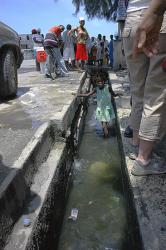Why Clean Water?
Clean Water: A Health Essential
Water is life. Clean water improves people’s health. International Action helps make clean water possible.
Haiti’s Clean Water Problem
A little girl stands in polluted water, holding a bucket to carry the water back
The UN estimates that almost one-tenth of the global disease burden could be prevented by improving water supply, sanitation, hygiene, and management of water resources. But Haiti, like many developing nations around the world, is currently devastated by a lack of clean water and the systems that provide it.

Most water sources are contaminated with human waste because of the absence of a sewage sanitation system. Still, that dirty water is often used for cooking and drinking – exposing men, women, and children to the germs that cause cholera, typhoid, hepatitis, chronic diarrhea, and other waterborne diseases are carried in water.
Since October 2010, there have been 388,950 cholera cases – the first reported case of outbreaks in decades. In Jacmel, one of the hardest-hit regions in Haiti, 22% of the people who contract cholera die. There have been over 5,000 reported deaths from cholera since the outbreak.
Additionally, the leading cause of infant mortality and illness in the children of Haiti is contaminated water. The country currently has the highest infant mortality rate in the Western Hemisphere. The United Nations Special Envoy to Haiti reported that 16% of child-under-five deaths in Haiti were directly related to waterborne diseases, before the earthquake. This number is now higher as a result of the earthquake and cholera outbreak.
Intestinal worms also pollute the water and cause debilitating side-effects in infected children and adults.
In Other Words…
“Over half of the world’s hospitals beds are occupied with people suffering from illnesses linked with contaminated water, and more people die as a result of polluted water than are killed by all forms of violence including wars.” Read the UN Environmental Programme’s report.
“Access to safe water and adequate sanitation services has proved to be one of the most efficient ways of improving human health. [It also] has other important benefits ranging from the easily identifiable and quantifiable (costs avoided and time saved) to the more intangible and difficult-to-measure (convenience, well-being, dignity, privacy, and safety).” Read the UN World Water Development Report.
International Action’s Solutions
International Action’s simple, sustainable solutions give people the clean water they need to live. We’ve already protected over 900,000 people, and every day we’re working to protect more. Among our live-saving programs are:
- Campaign for Clean Water: Our flagship program that uses energy-free chlorinators and neighborhood water tanks. It’s a community-based and community-led program that currently protects over 900,000 Haitians from waterborne diseases.
- Clean Water in Schools: We provide schools with chlorinators and tanks and train teachers to educate their students on the importance of water and hygiene. 43,511 children are currently protected from waterborne diseases through this program.
- Cholera Prevention Consortium: We have created a consortium of over 20 non-governmental organizations (NGOs) and local groups to combat the cholera pandemic. We have donated enough chlorine through this group to provide clean water for over 1.5 million Haitians.
- Chlorine Distribution System: A network of locally operated chlorine distribution sites that will empower our communities to maintain and sutain their supply of clean water while providing a model that can be replicated throughout the country.
Check out what our clean water programs can do for Haiti:
- Prevent deaths. Providing clean water is a direct, cost-effective way to prevent deaths. In Haiti alone, clean water can save the lives of over 60,000 children.
- Improve quality of life. Dirty water can cause sicknesses that force people to miss work and school, costing them money and education. Clean water can help them stay in school, go to work, and lead better lives.
- Reduce suffering. Diarrhea, cholera, and other waterborne diseases can mean crippling pain, vomiting, dehydration, and malnutrition in adults and children. The value of preventing that suffering can’t be overestimated, and clean water can make it happen.
- Empower the community. At International Action, we’re not just giving people clean water – we’re giving them the tools and training they need to take care of their water supplies. We’re working to give the people of Haiti control over their health.
To learn more, visit Our Work
